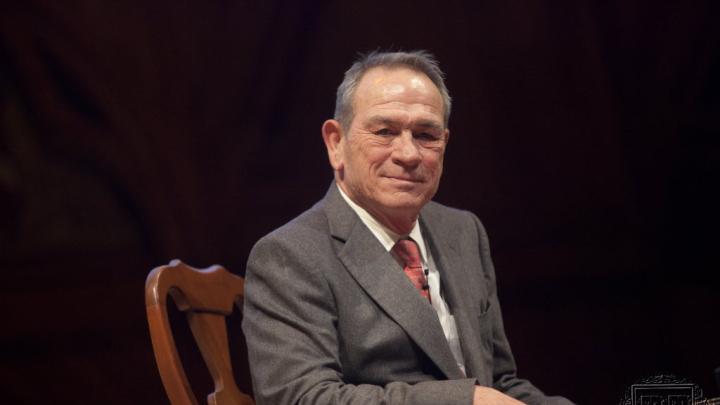Film actor Tommy Lee Jones ’69 received the Harvard Arts Medal on Thursday, April 27, in Sanders Theatre. The event launched the 2012 Arts First celebration, and Arts First’s progenitor, actor John Lithgow ’67, Ar.D. ’05, engaged in a stimulating onstage conversation with his fellow thespian before President Faust presented Jones with the medal. In her remarks, she noted that Jones “can take us to the crossroads of the comic and the terrible, the violent and the honorable, with a single ironic retort. He invites us to look at life without flinching, until it yields a spare truth.” On receiving the award, the actor stepped to the lectern and declared, “My experience here [as a Harvard student] is the best thing that’s happened in my creative life, and the reason for that is not simply what I learned, but that I learned how to learn, and I will be grateful for that as long as I live.”
Jones has appeared in 50 motion pictures, often in starring roles, and has received a sheaf of awards for his performances. Thrice nominated for an Oscar, he won the Best Supporting Actor award for his portrayal of federal marshal Samuel Gerard in the 1993 thriller The Fugitive. His depiction of murderer Gary Gilmore in the 1982 television film The Executioner’s Song earned him an Emmy for Outstanding Lead Actor. He is the eighteenth recipient of the Arts Medal, which was first awarded in 1995.
Jones also won a place in Ripley’s Believe it or Not for landing a role in a Broadway show only 10 days after graduating from Harvard in 1969. In college he was an All-Ivy football lineman, part of the team that went undefeated his senior year (and famously tied Yale, 29-29 with a last-gasp rally), as well as a significant presence in undergraduate theater; he and Lithgow reminisced about stages they once shared in productions at the Loeb Drama Center. Jones disclosed that his acting career actually began in second grade, when he took the role of Sneezy in Snow White and the Seven Dwarfs. (“That’s a very good part,” Lithgow interjected.) When Jones enrolled in college, he recalled, his Texan grandparents “couldn’t even pronounce ‘Harvard.’ ”
The two actors, who both acknowledged Lincoln Kirstein ’31 as one of the most important figures in American arts in the twentieth century, had some fun reminiscing about being cast in White House Happening, a play—and not a good one—written and directed by Kirstein and produced at the Loeb one summer. During rehearsals, Kirstein, “not the most stable man in the world,” as Jones noted, gradually lost his grip on reality, climaxing his breakdown by appearing at one rehearsal with a butcher knife, a bottle of vodka, and wearing only underwear. “He was untethered,” said Jones.
The future movie star landed a small role in the 1970 film Love Story, even though at his first meeting with the casting director, she said, “You’re not right,” before he had even spoken a word—a baffling judgment considering that the part he aspired to (and ultimately played) was a Harvard football player.
Jones also expounded on his love of polo, a sport he has played for many years and calls “the finest thing a man and a horse, or a woman and a horse, can do together.” He has generously supported the Harvard Polo Club with gifts of horses, and has invited them to his ranch in Texas, and to Florida, where they have trained, with Jones taking part. When Lithgow observed that it must have been a treat to act in such a “horse-centric” story as Lonesome Dove, Jones proposed a neologism: “Equicentric?”
When the conversation turned to acting, Jones (who also supports the Harvard Film Archive) said, “Our job description is ‘player.’ It beats the hell out of working for a living.” He added that if you are lucky enough and work long enough at acting, you may “get good enough to realize that what you’re doing is a privilege.” Lithgow wrapped up their conversation by remarking, “I can’t wait ’til we work together again, Tom.”
The audience followed with questions. “If you want to lead a creative life,” Jones told one interlocutor, “the first thing you have to do is abandon all hope of security. Emotional, financial, any kind of security—you’d better not need it. If you don’t have to be an actor, please do something else.” But for those with the irresistible calling, his advice was to “go to the theater and stay there and do something, even if it’s nailing canvas on flats. Go to the theater and live there.”
Some of the questioners were old friends, and more than once Jones added, “I’ll see you later” to his answer. He recounted a multifaceted life as a rancher and family man who draws satisfaction from a wide range of activities. “Weaning a calf at 700 pounds under drought conditions is like hitting a grand slam home run,” he said, adding that seeing his daughter acting in a play, hearing his son play guitar, or viewing his wife’s photographs are all gratifying. When an impish undergraduate prefaced her substantive question by asking, “First, will you marry me?” Jones gave her one of his classic deadpan replies. “Yes, I will marry you,” he said. “But you’ll have to talk to my wife first. She’s sitting right over here.”







